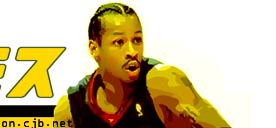





| Iverson wants to be like Mike |
|---|
|
One moment he's pouring in points unlike any rookie ever has, the next moment he's being dogged for it. One moment he says he's not hanging out with the wrong crowd, the next he's being arrested on gun and drug charges. One moment he's huddling with the commissioner, the next he's being suspended by him. Bad things and good things happen to Allen Iverson, and it seems everyone wants to dwell on the bad. Never has there been a young NBA player with as much talent and as bad an image. Never has someone who will be such a big part of the league's future turned off so many people. "A lot of people judge me on what they heard or read, but it wasn't fair," said the star guard of the Philadelphia 76ers. "People were writing terrible stories about me and they hadn't even interviewed me. "But I'm used to it. It's just another way to try to tear me down and it's another obstacle I've got to overcome. I've always said today's newspaper is tomorrow's toilet paper. And I'll always believe that, always." Some people seem to have a profound dislike for last season's rookie of the year, but they better get used to him. When it comes time for someone to get a bigger contract than Kevin Garnett's, it might be Iverson. When Michael Jordan is gone, the Bulls are bad and basketball fans start to focus on the next generation, they'll turn to Iverson, the unrepentant speed demon who can score like Jordan, wreak havoc like Isiah Thomas and get into trouble like Marvin "Bad News" Barnes. No one else is as fun to watch, no one else says things the same way, no one else will be as interesting in the future. Not Grant Hill (too happy), not Garnett (too unproven) and not Tim Duncan (too bland). The 22-year-old Iverson wants to be 'The Next Man." "Definitely. It would be a great honor to be the 'next guy' after Michael Jordan. I'll be able to accept that role and I'd love to take on that challenge in my life," he said. "But I'm not going to run out and try to change my image and be like people want me to be. I'm going to be the person that my family and friends respect and the person that those people know." There he goes again. Opposite ends of the spectrum, the public's wishes be damned. One minute he wants to be the next Jordan, the next he wants to stay the same Iverson. He wants to have it both ways -- and he thinks he can. "I don't have to change a whole lot of things for all those people out there in the world. All I care about is the people that know me and the people who care about me. They know I'm not a person who's getting in a whole lot of trouble -- although I don't want kids running around thinking I'm bad -- 'cause I'm not. But I can't please everyone." Trying to please his teammates and coach was what landed Iverson in one of his most criticized episodes last season. Late in the year, when the Sixers had been eliminated from the playoffs and Iverson was making a scoring push in his quest for the rookie of the year award, he scored at least 40 points in four straight games to break Wilt Chamberlain's rookie record. The fourth game in that streak was in Cleveland on a Saturday night in mid-April when Iverson was coming off performances of 44 points against the Bulls, 40 against Atlanta and 44 against Milwaukee. He stepped to the foul line in the fourth quarter with 48 points and a crowd of more than 20,000 booing him -- just as he had been booed at the same arena at the All-Star game when he had come to town perceived as the leader of the Knucklehead Generation. Both foul shots went in, giving Iverson 50 points, and a strange thing happened: The crowd gave him a standing ovation. Fearful of the reception he would receive, Iverson had talked his mother out of traveling to the game to see him try to break Chamberlain's record. "She was on her way out the door to catch her flight, but I told her I didn't want her to hear the things they say to me here," Iverson said. "Now, I wish she had been here." One more regret in a lifetime full of them, although none were more life-changing than when an 18-year-old Iverson was sentenced to five years in prison for his part in a bowling-alley brawl. Iverson spent about four months behind bars before he was granted clemency. He went to Georgetown for two years before turning pro. More regrets were on the way. Two nights after his 50-point game, Iverson had 37 points late in the fourth quarter as the Sixers were being trampled by the Bullets. With 25 seconds left, Philadelphia called a timeout to set up one more shot for Iverson, a 3-pointer that would extend the streak. The Bullets were incensed. "They sat back and let me shoot that 3. They gave me a 3 that I wish I had never shot. They didn't give me the other 37," Iverson said. "I wanted it to end right there. I told the coach I didn't want it, but everyone wanted me to get it so I went out and got it." So much for the good feelings embodied by the standing ovation in Cleveland. Iverson, the perception was, had gone too far this time, putting individual statistics ahead of team basketball. Word spread fast of the so-called "tainted 40." No one seemed to remember the 50-point night. Some voters held it against him when they cast their ballots for rookie of the year. Charles Barkley dubbed him "Allen Me-Myself-and-Iverson." "They didn't talk about how my teammates and coach wanted me to get it. They criticized me," Iverson said. "It was a bad experience. I'm not a selfish basketball player." Fast forward one month. The rookie of the year ballots are in and Iverson has won. It's Monday and the news conference will be Wednesday. Somebody in the Sixers front office realizes that Iverson hasn't been in touch. A team employee is dispatched to Hampton, Va., to find him and make sure he gets to Philadelphia on time for the news conference. The employee arrives at the airport, is met by a gold-toothed, tough-looking chauffeur named Phil who works for boxer Pernell Whitaker and is connected enough to know where Iverson can be found. Down the neglected streets of the city they go, checking one house, checking another until finally somebody knows Iverson's whereabouts. "Do you think I was going to miss my own rookie of the year press conference?" Iverson asks the employee incredulously. He didn't miss it, but he accepted the award wearing a white skullcap. Sixers president Pat Croce described what happened next. "I went up to visit with the commissioner and the deputy commissioner and they didn't like the skullcap," Croce said. "They had a picture of me giving him the award and they didn't want to release it because they had heard the skullcap represented a prison gang. That's what their security people told them. "I said 'Are you kidding? It's got a Reebok logo on it.' I told them I'd send them one to wear." In an apparent act of remorse, deputy commissioner Russ Granik opened Croce's package, donned the skullcap and wore it around the office. Score one for Iverson in the battle over being misunderstood. Fast forward another month. It's a hot summer night 20 miles east of Norfolk, Va., and a state trooper clocks a car going 93 mph down Interstate 64. He pulls it over, smells marijuana, searches the car and finds one joint under the seat, another in the back and a loaded .45 caliber pistol on the floor mat of the passenger seat where Iverson was sitting. It is Iverson's gun, and he is arrested on drug and weapons charges. He eventually pleaded no contest and got two years' probation that includes drug testing. The arrest brought a call from commissioner David Stern's office. It was time for Stern and Iverson to talk. The two of them met in the commissioner's spacious corner office on the 15th floor of a midtown Manhattan skyscraper. Neither Iverson nor Stern would discuss specifics of the meeting, but it's clear the session was meant as a warning. "You step onto this stage, you're expected to comply with certain performance standards on and off the court," Stern said. "If you slip, you expect to get kicked around. If you excel, you expect to be adored. "Allen has enormous potential and drive, and he can be one of the great ones. There will be a lot of people watching to see him succeed and others without such lofty wishes. "People watch, and they're not necessarily wishing you well. When you're on the top, people become skeptical and enjoy seeing falling stars." A few weeks after the meeting, Stern suspended Iverson for one game and Isaiah Rider of Portland for two games. Rider had been caught with illegally cloned cellular phones. In another case, he was in a car with several men who had been smoking marijuana. "That substance can impair people and cause them to be guilty of criminal conduct. We don't want that," Stern said. "I think it's incumbent upon us to make a statement about it." NBA players are not tested for marijuana and there are no penalties in the collective bargaining agreement for players caught with it. Yet Stern, in what was seen as grandstanding by some, announced the Iverson and Rider suspensions shortly after training camp began. The union has filed a grievance. "The league is really image conscious and image driven, and they don't want the league looked upon as it was in the early '80s -- too black and drug infested," former union president Buck Williams said. "The league has to be a little concerned at the age these players are coming in and the amount of responsibility they have to handle. They carry an NBA logo everywhere they go, so it has to be a little scary." Stern vehemently rejected Williams' theory. "If race once was an issue in terms of public perception, it isn't now. The public is embracing our players. Michael Jordan is black, and he's the most popular athlete on the face of the planet.' Stern is clearly uncomfortable with the idea of Iverson's generation taking the mantle from Jordan after he retires. Ask the commissioner if Iverson will be the player who will one day make the average fan click on an NBA game, and he doesn't agree. In Stern's perfect future, fans will be equally mesmerized by the Juwon Howards and Shareef Abdur-Rahims of the world. "The next time Michael retires, the attention is going to turn to the younger generation, Shaq, Penny, Grant Hill, and then the group behind them, the Kobe Bryants, the Iversons, the Marburys, the Garnetts," he said. Others disagree. "David Stern can pooh-pooh it all he wants, but he's looking for the next M.J.," players union director Billy Hunter said. "I was just in Paris with Michael and the Bulls, and the fans over there were mesmerized and fanatical about Michael. "I truly think Allen is going to be that next guy." So does Iverson, who wants to be the next guy on his own terms -- earning it whether people like it or not. "You can't pick the guy to carry the torch after Michael Jordan," Iverson said. "It's not about whoever society picks to be that guy. It's going to be about who proves it on the basketball court. "That would be another obstacle in my life that's I'll take on. I'll be glad to have that. It would be a great honor to be said as the next guy after Michael Jordan."
|

|
|---|
| Author |
| ------ |
| Source |
| Nando.net |
| Return to Articles |